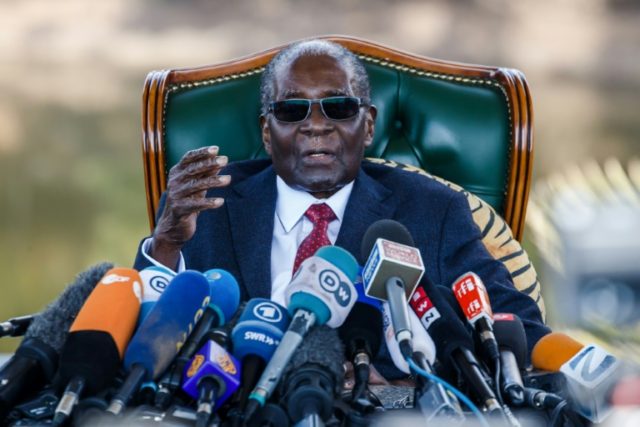Former Zimbabwe President Robert Mugabe died Friday at the age of 95. His successor Emmerson Dambudzo Mnangagwa confirmed the death on Twitter and offered his condolences.
He said: “Cde Mugabe was an icon of liberation, a pan-Africanist who dedicated his life to the emancipation and empowerment of his people. His contribution to the history of our nation and continent will never be forgotten. May his soul rest in eternal peace.”
Many others will disagree with that sentiment, saying a man at first lauded as a genuine liberator of Africa eventually became a blood-soaked tyrant who took his country from the bread basket of Africa to basket case in one generation.
His 40-year leadership of the former British colony was marked with bloodshed, persecution of political opponents and vote-rigging on an industrial scale.
Mugabe’s lasting legacy was epitomised by British author Andrew Norman in his book, Robert Mugabe and the Betrayal of Zimbabwe. He wrote:
Instead of leading his people to the promised land, Mugabe on the one hand amassed a fortune for himself, his family and his followers and on the other hand presided over the deliberate murder, torture and starvation of those who opposed him. In short Mugabe betrayed his people.
Born on February 21, 1924, in what was then British-ruled Southern Rhodesia, the self-confessed Marxist was raised in a Catholic mission before becoming a school teacher.
He joined the National Democratic Party under Joshua Nkomo in its fight against the government of Rhodesian Prime Minister Ian Smith, who had broken away from Britain in 1965 in an effort to prevent the introduction of black majority rule.
Mugabe was jailed for 10 years in 1964 for anti-government comments and on release in 1974 joined and later led the victorious guerrilla war conducted from Mozambique against Smith’s breakaway regime.
He rose through the ranks of the rebels to become the head of the Zimbabwe African National Union – Patriotic Front (ZANU-PF)
As ZANU leader, he became prime minister of the new Republic of Zimbabwe in 1980 and assumed the role of president seven years later.
In 2000 he led a campaign to evict white farmers from their land, which was given to black Zimbabweans, and led to famine.
Mugabe retained a strong grip on power, through allegations of vote-rigging elections on a monumental scale, until he was forced to resign in November 2017, at age 93.
His brutal record will live long after his name is forgotten.
Zimbabwean Senator David Coltart, who was once labelled “an enemy of the state” by Mugabe, said his legacy was marred by his adherence to violence as a political tool.
“He was always committed to violence, going all the way back to the 1960s… he was no Martin Luther King,” he told the BBC World Service. “He never changed in that regard.”
Mugabe had been receiving treatment in a hospital in Singapore since April when he died. His funeral arrangements have yet to be announced.
AP and AFP contributed to this story

COMMENTS
Please let us know if you're having issues with commenting.